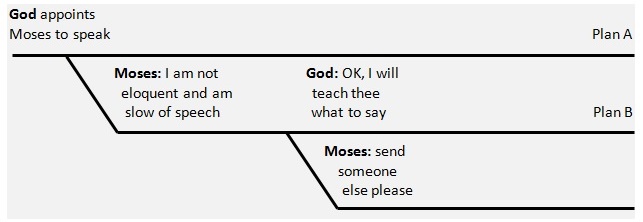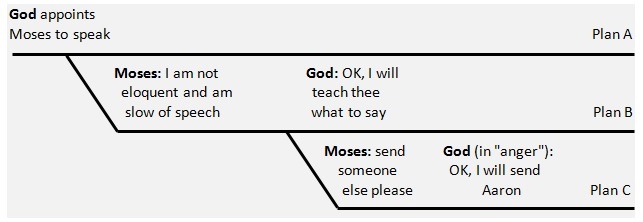Moses Turns God Down
God met Moses at the burning bush and gave him the good news about the plan to deliver Israel from Egyptian bondage. It was good news to Moses until Moses learned that he was to be the one to lead them out:
“Come now therefore, and I will send thee unto Pharaoh, that thou mayest bring forth my people the children of Israel out of Egypt.” (Exo 3:10)
God’s plan was to send Moses to Pharaoh to speak on His behalf and negotiate Israel’s release:

How should Moses have responded? Perhaps something like Isaiah did: “… Here am I; send me.” (Isa 6:8) But what did Moses say?
“And Moses said unto the LORD, O my Lord, I am not eloquent, neither heretofore, nor since thou hast spoken unto thy servant: but I am slow of speech, and of a slow tongue.” (Exo 4:10)
Moses objected with an excuse. Either he had a legitimate concern or he just wanted out of the assignment.

Moses was making excuses, saying no thanks. How did God reply? Did He strike Moses dead? No. Basically, God accommodated Moses’ concern and proposed a Plan B, a workaround for the problem:
“And the LORD said unto him, Who hath made man’s mouth? or who maketh the dumb, or deaf, or the seeing, or the blind? have not I the LORD? Now therefore go, and I will be with thy mouth, and teach thee what thou shalt say.” (Exo 4:11-12)

God was saying OK, I will accommodate your concerns. We could call that Plan B. That should have taken care of Moses’ concern – what better teacher could one have of what to say or how to speak? How did Moses respond?
“And he said, O my Lord, send, I pray thee, by the hand of him whom thou wilt send.” (Exo 4:13)

Here are some other versions for verse 13:
“But he said, ‘Oh, my Lord, please send someone else.'” (Exo 4:13, ESV)
“But Moses said, “O my Lord, please send anyone else whom you wish to send!” (Exo 4:13, NET Bible)
“And he said, O my Lord, send, I pray you, by the hand of another whom you will send.” (Exo 4:13, King James 2000 Bible)
“But Moses said, ‘Pardon your servant, Lord. Please send someone else.'” (Exo 4:13, NIV)
“But Moses again pleaded, “Lord, please! Send anyone else.” (Exo 4:13, New Living Translation)
You can almost hear the desperation in Moses in that last version. Moses essentially said “no thanks.”
What was God’s response?
“And the anger of the LORD was kindled against Moses, and he said, Is not Aaron the Levite thy brother? I know that he can speak well. And also, behold, he cometh forth to meet thee: and when he seeth thee, he will be glad in his heart. And thou shalt speak unto him, and put words in his mouth: and I will be with thy mouth, and with his mouth, and will teach you what ye shall do. And he shall be thy spokesman unto the people: and he shall be, even he shall be to thee instead of a mouth, and thou shalt be to him instead of God.” (Exo 4:14-16)

Later history (the golden calf incident etc) showed that Aaron, in that position, caused problems for Israel. So it was not the best arrangement; certainly not God’s original plan yet He made another accommodation to meet Moses’ concerns.
The account of this concession leading to Plan C starts with “the anger of the LORD was kindled against Moses” followed by, not a punishment for disobedience, not even a rebuke but simply by suggesting an alternate arrangement that would be more acceptable to Moses.
It could be that the “anger” was simply His “withdrawal” to not “be with” Moses’ mouth as originally proposed and to instead appoint an intermediary spokesman. There was certainly no indication that the anger was what we would commonly understand to be anger. There were no words of reprimand, no angry actions were mentioned. In fact, consider what was said:
The “angry” LORD:
- mentioned Moses’ brother
- complimented Aaron’s speech
- said Aaron was coming to meet Moses
- said Aaron would be glad to see Moses
- said Moses would be to his brother as God
There was not an angry word in there and it is hard to imagine those words of good news being spoken in an angry tone of voice. Surely Moses would have been glad to see his brother Aaron after 40 years.
God’s “anger,” “wrath,” “fury” etc is consistently used in scripture in association with His withdrawing from people or from certain aspects of their life or situations. There are certainly times when He abandons them to a much greater degree than simply not using them as His spokesman to a Pharaoh. If they are abandoned/given up to their enemies, to themselves or to the destructive forces of nature much worse consequences can come.
Moses was not giving up on or rejecting God – He simply did not want to be God’s spokesman. No doubt, he lost a blessing through his reluctance but God accommodated his wish.
We can see that this follows the pattern of: man sins, God in “wrath/anger” accommodates the sinner, and, finally, trouble comes that is referred to at: https://characterofgod.org/wrath-of-god/. (I have found about 70 examples so far of this pattern.) In summary, this is what happened:
Moses’ sin of distrust caused the Lord’s wrath which was manifested in God accommodating (at Moses’ own request) Moses in the sense that He would then not use Moses directly as a spokesman to Pharaoh as He had proposed and instead appointed Aaron in Moses’ place in that role and we know the trouble (the golden calf incident etc) that resulted from Aaron holding the position of authority that he did.
Even though it was not what was originally proposed by God, not His plan A, God accommodated Moses’ concerns and went with plan B and even plan C.
Return to Examples of God’s Accommodation

November 12, 2017 @ 8:35 pm
Great read Ray. Thanks, very interesting.
August 11, 2019 @ 7:00 am
Hello Ray,
I am truly grateful to God for helping me to discover your site. Your write ups have been a great blessing to me. So many hard to understand truths, like this one on the anger of the Lord have been opened to me. I thank you so much for allowing God to use you like this. I love your work. God bless you sir. Please how can I send questions to you on areas I may need more light? – Pst Tosan from Nigeria